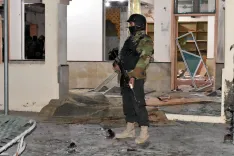Is Canada Ignoring Illicit Funding Channels Linked to Khalistani Extremists?

Synopsis
Key Takeaways
- Khalistani-linked money laundering poses significant risks to Canada's financial integrity.
- Illicit funding channels threaten national cohesion.
- Drug trafficking and misuse of NPOs are key methods used by extremists.
- Foreign interference is a growing concern in shaping domestic policies.
- Decisive action is needed from all sectors to combat these issues.
Ottawa, Sep 8 (NationPress) Khalistan-related money laundering is not only a significant financial crime issue in Canada but also one charged with political implications. Ignoring this problem threatens both financial integrity and national unity—a cost that Ottawa cannot afford, a report highlighted on Monday.
In its latest evaluation, the Canadian government pointed out that Khalistani extremists and their financial allies have utilized drug trafficking, hawala-like informal value transfer methods, and the exploitation of Non-Profit Organizations (NPOs) to discreetly move funds within Canada.
The document titled '2025 Assessment of Money Laundering and Terrorist Financing Risks in Canada' emphasized the increasing link between transnational organized crime and terrorism, warning that criminal supply chains are being exploited by terrorist actors.
As reported by Khalsa Vox, foreign threat actors, including those with political motivations, continue to take advantage of Canada's open environment. The Khalistan cause—rooted in the demand for an independent Sikh homeland—has predominantly been financed through illicit foreign channels.
"Khalistan-related extremism has historically been intertwined with foreign state interests, whether through passive tolerance or active sponsorship. The report cautions that proxies within Canada can receive funds—both legally and illegally obtained—to further agendas harmful to Canada’s interests. When such funds are laundered through legitimate businesses, NPOs, or personal remittances, they blend into the broader legitimate economic landscape," it stated.
The assessment also raised alarms about foreign interference, mentioning how foreign states or their proxies channel funds into Canada to influence domestic policies and community dynamics, labeling it a current operational threat.
According to the report, the Khalistan issue transcends historical grievances; in today’s era of instantaneous communication and global activism, overseas conflicts can manifest on Canadian streets, as seen in the recent diplomatic tensions with India.
Given that financial channels are lifelines for such activism, their compromise through laundering has implications that reach beyond law enforcement into the realm of foreign policy.
"Money laundering is not a victimless crime. When linked to ideological extremism, it can finance propaganda, incite violence, and divide communities. The 2025 Assessment of Money Laundering and Terrorist Financing Risks in Canada has highlighted these patterns. Now, it is imperative for political leaders, enforcement agencies, and community stakeholders to respond decisively and impartially," the report concluded.









